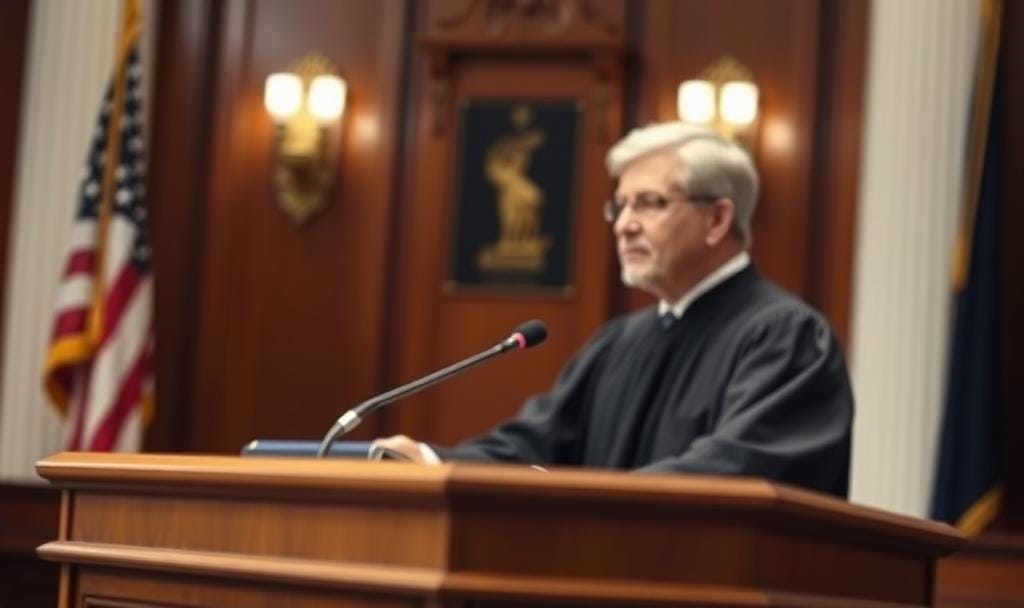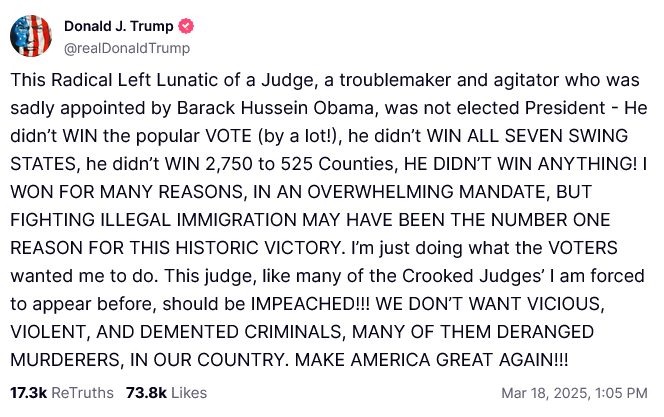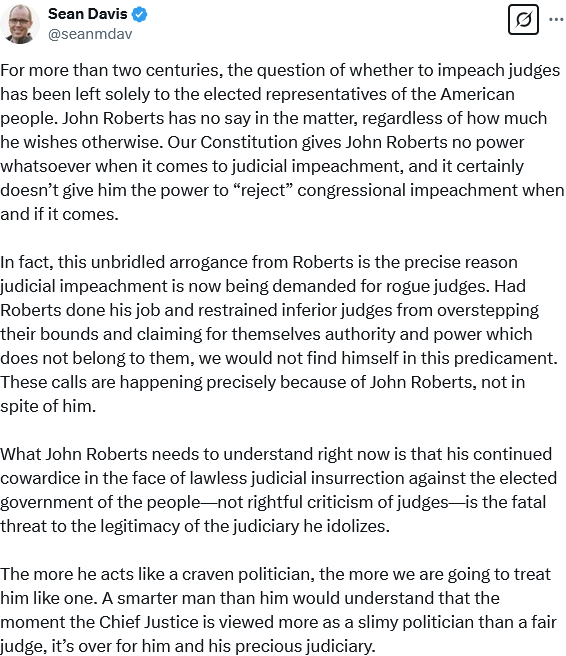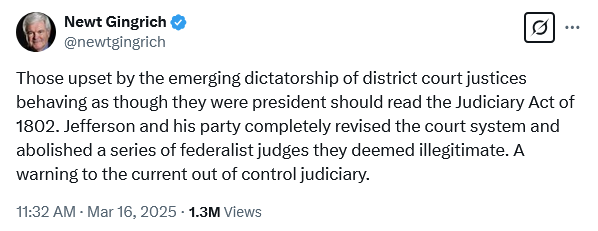Once again, Donald Trump seems on a collision course with a courtroom.
This time, however, he might not be the defendant. That role may end up being played by one or more federal judges, especially after Judge James Boasberg issued a Temporary Restraining Order prohibiting Donald Trump from deporting a number of alleged members of the Venezuelan gang Tren de Aragua under the Alien Enemies Act of 17981.
U.S. District Judge James Boasberg in Washington, D.C., on Saturday imposed a two-week halt to deportations under President Donald Trump's invocation of the Alien Enemies Act of 1798 to declare that the Venezuelan prison gang Tren de Aragua was conducting irregular warfare against the United States.
Alas for Judge Boasberg, by the time the TRO was transmitted, the deportation flights had already left US airspace and were en route to El Salvador.
Unsurprisingly, Judge Boasberg was not happy that his TRO was seemingly ignored, and demanded to know why that had happened. Yet President Trump and his team are unfazed by the judge’s wrath, and instead began ramping up calls for the judge to be impeached.
President Trump may very well be right. Impeachment may be the solution.
Law Or Politics?
There is little doubt that Judge Boasberg has zero reluctance about clashing with the President. In addition to issuing the TRO, Judge Boasberg turned the case into a class action litigation and declared all non-citizens to part of the covered class.
Hours before the proclamation's release, Boasberg in Washington, D.C., granted a temporary restraining order Saturday and ordered the government not to deport five Venezuelan nationals cited in a lawsuit brought by two nonprofits, Democracy Forward and the American Civil Liberties Union.
During a subsequent hearing Saturday evening, the judge turned the lawsuit into a class action and extended the temporary restraining order to all noncitizens in the United States covered in Trump's invocation of the Alien Enemies Act.
Intriguingly, while this was happening, President Trump received a gesture of support from El Salvadoran President Nayib Bukele, who called the judge’s action’s a “judicial coup”.
President Bukele had agreed to accept the Venezuelan gang members and to incarcerate them within El Salvador’s prison system.
Trump unsurprisingly took to his Truth Social platform to denounce the judge’s actions and issued a call for the judge to be impeached.
This in turn prompted a rare bit of pushback from Chief Justice John Roberts, who took issue with the impeachment threat.
“For more than two centuries, it has been established that impeachment is not an appropriate response to disagreement concerning a judicial decision. The normal appellate review process exists for that purpose,” Roberts said Tuesday in a rare and brief statement issued just hours after Trump publicly joined demands by his supporters to remove judges he called “crooked.”
The core of the legal challenge is Donald Trump’s invocation of the Alien Enemies Act of 1798 in his Executive Order commanding the gang members’ deportation.
I find and declare that TdA [Tren de Aragua] is perpetrating, attempting, and threatening an invasion or predatory incursion against the territory of the United States. TdA is undertaking hostile actions and conducting irregular warfare against the territory of the United States both directly and at the direction, clandestine or otherwise, of the Maduro regime in Venezuela.
Because the Alien Enemies Act is on the books, and because it gives the President broad powers of deportation of designated “alien enemies”, President Trump’s Administration takes issue with the notion that a District Judge can somehow issue a TRO and shut down an entire Presidential program without even a full evidentiary hearing.
The law is quite likely on Donald Trump’s side. As far back as 1866, during the time when Reconstruction was getting started in the South at the end of the Civil War, in Mississippi v Johnson2, the Supreme Court ruled that the judiciary had no power to enjoin the Executive from discharging its sworn duty.
The Congress is the legislative department of the government; the President is the executive department. Neither can be restrained in its action by the judicial department, though the acts of both, when performed, are, in proper cases, subject to its cognizance.
Regardless of any controversies surrounding the Alien Enemies Act, it is legitimate U.S. law and its enforcement mechanisms are certainly within the scope of Presidential authority.
For this reason, John Robert’s pushback occasioned a few rebukes of the Chief Justice, with conservative journalists such as Sean Davis taking Roberts to the proverbial woodshed.
Regardless of the legal merits and demerits of the impeachment argument, there is little doubt that the idea of impeaching miscreant judges who are attempting to stymie President Trump’s agenda is gaining traction within the President’s MAGA voter coalition.
Nor is Judge Boasberg the only judge to attract Donald Trump’s ire. A number of judges have issued rulings and injunctions to stymie President Trump’s agenda, and Trump seems determined to find a way to put a stop to that.
Perhaps the most notorious of these judges is none other than Judge Tanya Chutkan, who earlier this week blocked the efforts of EPA Administrator Lee Zeldin from clawing back some $20 Billion in EPA grants which Zeldin has determined were improperly released to a set of eight non-profit agencies.
As previously reported, an EPA advisor was exposed in a Project Veritas undercover video admitting that the agency rushed to allocate billions of taxpayer dollars to climate change initiatives just before President Donald Trump’s inauguration.
Zeldin said the $20 billion was “awarded to just 8 entities that were then responsible for doling out your money to NGOs and others at their discretion with far less transparency. Just under $7 billion was sent to one entity called the Climate United Fund.”
Judge Chutkan, we should note, was the District Court Judge that had been hearing Jack Smith’s J6 lawfare case against Donald Trump.
No conflict of interest there, I’m sure!
Zeldin had last month taken to X to announce the discovery of the improper grants and that steps were being taken to recover the funds.
This was not the only clawback that Zeldin has been pursuing. There is also some $2 Billion in grants doled out to former Georgia gubernatorial candidate Stacey Abrams which had been uncovered by the Department Of Government Efficiency (DOGE).
There was a further $5 Billion which had been disbursed by Jahi Wise, director of the EPA’s Greenhouse Gas Reduction Fund, to a former employer of his, the Coalition for Green Capital. This was part of the money trail that apparently led Lee Zeldin to the $20 Billion that Judge Chutkan said the EPA could not reclaim just yet, despite the glaringly obvious conflicts of interest in grants such as that overseen by Jahi Wise
With an array of federal judges seemingly only too eager to rule against the Trump Administration, it is not hard to fathom why impeachment is becoming increasingly attractive as a response.
Impeachment
President Trump is far from the only one interested in impeaching federal judges. At least a few GOP members of Congress are also on board with the idea. As of this writing there have been four separate impeachment resolutions filed within the House of Representatives.
Unsurprisingly, a number of federal judges think these impeachment articles are a bad idea.
Judge Jeffrey Sutton of the U.S. Court of Appeals for the 6th Circuit responded to a question about the resolutions in a press call with reporters Tuesday after a meeting of the U.S. Judicial Conference.
“One thing worth keeping in mind is if we dilute the standards for impeachment, that’s not just a problem for judges, that’s a problem for all three branches of government,” said Sutton, the head of the conference’s executive committee.
And Judge Richard Sullivan of the U.S. Court of Appeals for the 2nd Circuit described the articles of impeachment as a concern, saying people can appeal to a higher court.
“Impeachment is not, shouldn’t be, a short-circuiting of that process, and so it is concerning if impeachment is used in a way that is designed to do just that,” Sullivan said.
The argument the judges are making—which is essentially the one echoed by Chief Justice Roberts—is that these are disputes over the particulars of individual rulings, and that the proper avenue for pursuing remedies regarding these individual rulings is the appellate process.
Yet, given the breadth of the issues in dispute, one has to wonder if that is a reasonable reading of the matter. The four judges on whom impeachment resolutions have been filed were hearing completely disconnected cases:
Judge John McConnell issued an injunction blocking President Trump’s order freezing federal grants and loans.
Judge Ami Ali ordered the Administration to continue payments made under discontinued USAID programs.
Judge John Bates issued a temporary order blocking the President’s Executive Order banning government agencies from promoting gender ideology.
Judge Paul Engelmayer sought to block Elon Musk and DOGE from accessing the Treasury’s Bureau of the Fiscal Service.
As has been observed by many (including yours truly), the DOGE efforts in particular are the very explicit campaign promises made by Donald Trump during the 2024 election campaign. The executive actions being blocked by these judges are things for which the American electorate unquivocally voted—and in the case of the spending freezes and DOGE, involved items and issues that had been previously uncovered by the General Accounting Office and various inspectors general.
Those who favor President Trump’s actions thus far, particularly regarding DOGE and spending, can perhaps be forgiven for thinking the judges might be slightly less than objective in their rulings. That is particularly relevant, because bias is very much grounds for impeaching a federal judge.
As Alexander Hamilton noted in Federalist 653, the key distinction when apprehending impeachments is that they are over quintessentially political issues.
A well-constituted court for the trial of impeachments is an object not more to be desired than difficult to be obtained in a government wholly elective. The subjects of its jurisdiction are those offenses which proceed from the misconduct of public men, or, in other words, from the abuse or violation of some public trust. They are of a nature which may with peculiar propriety be denominated POLITICAL, as they relate chiefly to injuries done immediately to the society itself. The prosecution of them, for this reason, will seldom fail to agitate the passions of the whole community, and to divide it into parties more or less friendly or inimical to the accused. In many cases it will connect itself with the pre-existing factions, and will enlist all their animosities, partialities, influence, and interest on one side or on the other; and in such cases there will always be the greatest danger that the decision will be regulated more by the comparative strength of parties, than by the real demonstrations of innocence or guilt.
Put simply, impeachable offenses are not particular violations of specific criminal statutes. Unlike the criminal indictment, no specific citation of a violated law is needed in articles of impeachment. Rather, impeachable offenses are best understood as affronts to the polity of the United States. That is the thrust of what the Constitution terms “high Crimes and Misdemeanors” in Article II Section 4.
The President, Vice President and all civil Officers of the United States, shall be removed from Office on Impeachment for, and Conviction of, Treason, Bribery, or other high Crimes and Misdemeanors.
While many abuses of office involve actual criminal conduct, abuses of office are not and have never been understood to be limited to actual criminal conduct.
Alexander Hamilton alludes to this in Federalist 664, in discussing the fitness of the Senate as a court of impeachments.
A SECOND objection to the Senate, as a court of impeachments, is, that it contributes to an undue accumulation of power in that body, tending to give to the government a countenance too aristocratic. The Senate, it is observed, is to have concurrent authority with the Executive in the formation of treaties and in the appointment to offices: if, say the objectors, to these prerogatives is added that of deciding in all cases of impeachment, it will give a decided predominancy to senatorial influence. To an objection so little precise in itself, it is not easy to find a very precise answer. Where is the measure or criterion to which we can appeal, for determining what will give the Senate too much, too little, or barely the proper degree of influence? Will it not be more safe, as well as more simple, to dismiss such vague and uncertain calculations, to examine each power by itself, and to decide, on general principles, where it may be deposited with most advantage and least inconvenience?
If the argument one has is that a particular ruling is legally flawed, then Chief Justice Roberts and his fellow jurists have a point—the appellate process is the appropriate process for having a relitigation of a matter brought before the courts.
But if we look at several of the fifteen impeachment cases brought against members of the federal judiciary since the Constitution’s ratification5, we quickly see that impeachments can arise when the challenge is predicated on something other than an incorrect reading of the law.
Associate Justice Samuel Chase was impeached in 1804 for “arbitrary and oppressive conduct” during trials.
West H. Humphreys was impeached in 1862 for “refusing to hold court”.
Harold Louderback in 1933 and Halsted Ritter in 1936 were impeached on charges of “favoritism”.
While statutory crimes quite clearly are a breach of trust with the people, the record of impeached federal judges shows that not every breach of trust involves a statutory offense. If judges are allowing their own personal and political biases to influence their rulings, that is also a severe breach of trust, a clear offense against the polity of the United States, and is therefore the exact sort of offense for which impeachment was woven into the Constitution.
While the appellate process would suffice for rectifying one miscreant ruling by a miscreant judge, the appellate process would not, absent some other process, prevent said miscreant judge from issuing another miscreant ruling later on.
That other process, within the Constitutional order of things, is impeachment.
Alternatives
Are there other avenues that President Trump and his supporters in the Congress might explore?
Absolutely. Part of the special genius of the Constitution is that it does allow for a fair amount of political innovation when addressing issues.
Former Speaker of the House Newt Gingrich called attention to one such alternative in a tweet advising GOP members of Congress to review the text of the Judiciary Act of 18026.
The federal courts, with the exception of the Supreme Court, are all created by Congress, and can be dismantled, restructured, and recreated by Congress as it sees fit. It is within the power of the President and the GOP to restructure the federal judiciary and, in the process, eliminate the courts presided over by miscreant judges.
This was the approach that was pursued by Thomas Jefferson after being elected President in 1800. After outgoing President John Adams had made a number of “midnight appointments”, Jefferson found himself saddled with a number of judges not exactly aligned with Jefferson’s own political ideology.
The solution: reform the judiciary and thereby remove the problem of miscreant judges. This was the means that Jefferson and his fellow Democrat-Republicans in the Congress selected for wresting control of the federal judiciary away from the Federalists. While even newly appointed Chief Justice John Marshall had doubts about the constitutionality of the Judiciary Act of 1802, eventually Marshall conceded that the act was a legitimate exercise of Congressional authority, and complied with the Act’s parameters for running the courts.
Do Donald Trump’s Republican supporters in the Congress have the votes to construct such a reform of the federal judiciary? Theoretically, yes, as they have voting majorities in both houses. The question would be whether or not they could persuade sufficient Democrats not to oppose the legislation so as to defeat any efforts at a filibuster.
Good Policy Or Bad?
Is Donald Trump right to be displeased at the rulings that have come down blocking his various Executive Orders?
Perhaps. Certainly it can be fairly said that his Executive Orders are entirely in line with Agenda 47, the platform on which he campaigned during the election and which, in broad strokes, comprises the promises he made to the American electorate in order to be elected President. Technicalities of law aside, there is a very substantive argument to be made that the rulings which have come down against him are thwarting the expressed will of the American electorate.
This should not be taken to mean that merely because President Trump enjoys a certain popularity that he is exempt from the technicalities of the law. In the case of his use of the Alien Enemies Act to deport alleged members of Tren de Aragua, where there exists a claim that detained individuals are not in fact members of that transnational criminal gang, there are individual rights of due process which should be respected. Persons who are not in fact part of that class of aliens President Trump has decreed be deported should not be deported under the presumption that they are part of that class.
At the same time, the Alien Enemies Act is actual law. It is a power of the President explicitly delegated to him by the Congress. As a statute, it survived multiple Democrat-Republican Congressional majorities in the years immediately after its passage, and has stood as law for well over two centuries. There seems little room to challenge the power it confers on the President to identify “alien enemies” and then to order their removal from the territory of the United States.
Yet challenging that power seems to be exactly what Judge Boasberg was doing when he broadened a litigation originally centered around five alleged Tren de Aragua members to cover virtually all non-citizens currently residing within US borders. Given that it has long been established Supreme Court precedent that the judiciary may not prevent the executive branch from carrying out its Constitutional duties, Boasberg’s sweeping order seems particularly contemptuous of President Trump’s Presidential authority.
Viewed in that light, Boasberg’s ruling is a clearly unacceptable attempt by a federal judge to supercede Presidential authority. That would be the very essence of a miscreant ruling and the very sort of offense against the polity of the United States for which impeachment has been provided as the Constitutional corrective measure.
At a minimum, these rulings opposing President Trump’s Executive Orders and efforts to fulfill Agenda 47 warrant substantial inquiry, not in an appellate court but within very public Congressional hearings. Impeachment hearings within the House of Representatives to derive actual articles of impeachment and to establish evidences of impeachable conduct, coupled with an impeachment trial within the Senate, is exactly the sort of public inquiry into judicial challenges to legitimate Presidential authority the Constitution not only authorizes but obligates.
Whether there would be at the end of the process sufficient votes to remove any of these judges from the federal bench is highly doubtful. 67 Senators have to vote to convict in an impeachment trial, which means more than a quarter of Senate Democrats have to agree with the Republicans that the conduct in question is impeachable. That is a most unlikely outcome.
Yet even without conviction and removal, the impeachment exercise would solidify one side or the other in these disputes over President Trump’s use of Presidential power within the court of public opinion. If Trump is overreaching, the impeachment process is the Democrats best chance to make the case to the electorate that Trump is overreaching, and that he needs to rein in his tactics more than a little. If Trump is not overreaching, the impeachment process is the best means to impress upon Democrats that he is carrying out the will of the American electorate and they are in the wrong for attempting to thwart that will.
This much is certain: within the Constitutional order that is at the heart of the American system is the notion that We The People are the ultimate authority. We The People are meant to be the ones who tell the Congress what laws to pass, and tell the President how to execute those laws. While we have judges to say what the law is, We The People are the ones who say what the law should be.
Donald Trump is on a collision course with the federal judiciary. At stake are the hearts, the minds, and the opinions of We The People. Whatever else might take place in this gathering conflict, a fulll and public airing is the way to ensure that, regardless of outcome, We The People emerge as the true winner.
At present, the impeachment process is the most likely way to achieve that.
Mississippi v. Johnson, 71 U.S. 475 (1866)
Hamilton, A. The Avalon Project : Federalist No 65. 7 Mar. 1788, https://avalon.law.yale.edu/18th_century/fed65.asp.
Hamilton, A. The Avalon Project : Federalist No 66. 11 Mar. 1788, https://avalon.law.yale.edu/18th_century/fed66.asp.
Federal Judicial Center. Impeachments of Federal Judges | Federal Judicial Center. https://www.fjc.gov/history/judges/impeachments-federal-judges.
Federal Judicial Center. Landmark Legislation: Judiciary Act of 1802 | Federal Judicial Center. https://www.fjc.gov/history/legislation/landmark-legislation-judiciary-act-1802. 2 Stat. 156











Impeachment by the house, trial by the senate and removal upon conviction was the remedy that the founding fathers intended for renegade public officials.
While the impeachment in the House was intended to be a political proceeding, trial in the Senate was intended to be a much more fair and unbiased process.
Then came the 17th Amendment. Because senators now pander to voters and donors, Senate trials have become as political as House impeachments. The process is now so infected with politics that unless one party makes up at least 2/3’s of the Senate or there is overwhelming evidence of an indisputable criminal offense that even the most calloused political hack cannot ignore, there will be no conviction.
I think only 8 federal officials have ever been convicted in the Senate. All were federal judges. Before the 17A there were convictions on charges like unlawful rulings and abandoning duties. After the 17A, the convictions were on charges like bribery and tax evasion and involved iron clad evidence.
The point is that the 17A broke the trial part of the impeachment/removal process. The upshot is that the process itself might serve as a punishment of sorts. However, the problem judge may simply return to service where he a or she may not only continue to be a problem, but may also be able to exact revenge.
No one believes the Senate will have the votes to uphold an impeachment. That's not the point though. As is often heard, "the process is the punishment," Not many judges are going to want to mount a defense, spending untold time and money, to sit in front of Congress and explain their thinking.
Probably only have to make an example of one or two and the rest will resist inventing law from the bench.